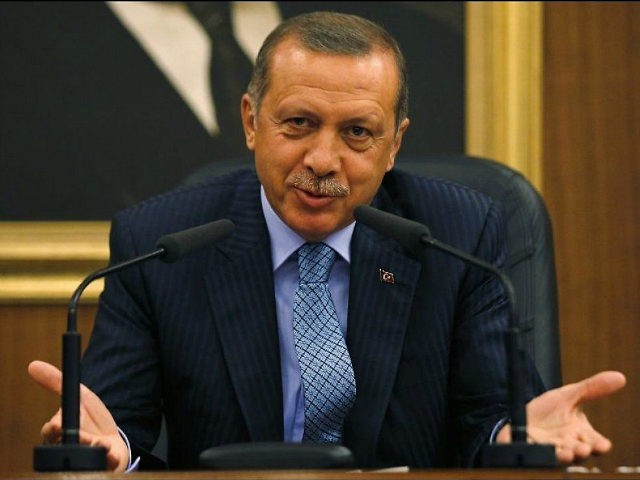“I don’t care if they call me a dictator or whatever else,” Turkish President Recep Tayyip Erdogan said in a defiant speech this Sunday, objecting to those who have called the mass arrests of opposition legislators an alarming challenge to the nation’s democratic institutions.
“It goes in one ear, out the other,” Erdogan added, in a speech in which he received an honorary degree at an Istanbul university.
The “they” in his speech, he later clarified, were human rights activists and political observers in the West, who used “newspapers, caricatures, calling us a dictator, and so on, expecting that we would take a step back. They should not expect this. We know these [tactics] very well,” he argued.
In the same speech, Erdogan went on to claim that “Europe, as a whole, is aiding terrorism” by supporting the Kurdistan Workers’ Party (PKK), a Marxist U.S.-designated terrorist group. Erdogan’s government extends the definition of “terrorist” beyond the PKK to Syrian Kurdish militias who regularly cooperate with the United States and are separate operational entities from the PKK, which primarily operates in Turkey.
The defensive remarks on whether he is a dictator follow a turbulent weekend in Turkey, after Erdogan’s law enforcement arrested the heads of the People’s Democratic Party (HDP), Selahattin Demirtas and Figen Yuksekdag, along with another dozen HDP legislators on Friday. Demirtas and Yuksekdag now face charges of “terrorism” and “aiding terrorism” for their repeated objections to Erdogan’s takeover of media corporations and attacks on Kurdish communities, particularly the Kurdish hub of Diyarbakir.
NDP members of parliament have announced they will not participate in the legislative process so long as their colleagues were behind bars.
The arrests followed the passing of a law stripping Turkey’s parliament of legislative immunity, allowing police to arrest lawmakers for statements made on the parliament floor.
“Motions [to remove immunity of HDP deputies] should not be let to rot on the shelves of the Parliament. The necessary action must be taken,” Erdogan said in May, encouraging support for the new law. “Nowhere in the world can you see a politician backing a suicide bomber.”
The HDP is a center-left coalition of Turkish minorities: Kurds, Christians, anti-Islamists, and Marxists. The party’s sweeping victory in June 2015 increased the number of women and minorities in the legislature significantly; Erdogan forced an election in November to undo the damage to his Islamist Justice and Development Party (AKP).
Demirtaş remained in office as HDP head, however, and repeatedly accused Erdogan of sponsoring terrorism himself, including referring to Erdogan as “an extension of ISIS” and accusing him of wanting to “establish a caliphate” for promoting a greater role for Islamic values in the government.
The Turkish government has yet to announce a trial schedule for the HDP leaders.
“For years, we called on you to say you are against terror and terrorist organisations. You would not listen,” Turkish Prime Minister Binali Yildirim said in an address Sunday meant to explain the actions of the government.
Yildirim claimed the HDP was appropriating legislative funds to the PKK, helping them buy weapons and plot suicide bombings.
“For years they transferred the money we sent for the municipalities to terror. Whoever harms this nation will pay for it, there is no other way,” he warned. “Not only those bombing and burning, but also those supporting terror.”

COMMENTS
Please let us know if you're having issues with commenting.